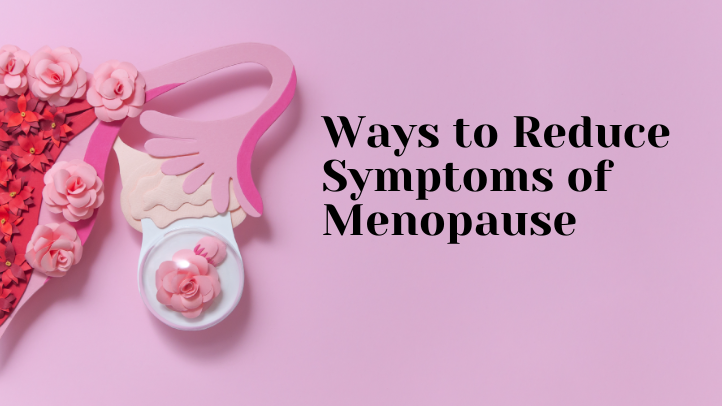
Ways to Reduce Symptoms of Menopause – Menopausal is usually associated with negative experiences and is seen as the end of womanhood. But actually, it is not true. It is a new chapter of life for a woman. There are a few symptoms associated with it that may affect the quality of life. But the good thing is that we can manage these symptoms with little effort. Here are going to discuss the ways to reduce symptoms of menopause.

Menopause is a long transition over years that emits several symptoms in a woman’s life. The average age of women going through menopause is 52. In this phase, the menstrual cycle stops permanently and the end of fertility. One has reached menopause if she does not get her periods for a year. There are low levels of progesterone and estrogen that may lead to the risk of certain health problems. The menopausal transition phase is referred to as perimenopause. There are three phases of menopause –
Here is the list of menopausal symptoms –
There are hormonal changes in the female during menopause that can lead to weakened bones and even increase the risk of osteoporosis. Females suffer from calcium and vitamin D and that’s why there must be vitamin D and calcium-rich food. For instance dairy products (yogurt, cheese, and milk) and leafy vegetables (kale, spinach). Also, you can add tofu, sardines, and beans to your diet plan. Moreover, the sun is the best source of vitamin D but with age, the skin is not efficient for making sufficient vitamin D. In that case, you can add dietary sources like cod liver oil, oily fish, and fortified food.
Weight gain is one of the common symptoms during menopause. It results from hormonal changes, ageing, genetics, and of course lifestyle. You will have more body fat near your waist and more susceptible to chronic illnesses like heart failure, and diabetes. So, it is important to keep a sharp eye on weight gain during menopause. Studies show that reducing weight significantly lowers the risk of hot flashes and night sweats.
Diet is also an important aspect of reducing the symptoms of menopause. You must include fruits and vegetables in your diet. As it helps in lowering the risk of heart failure and weakening bones. Also, cut the refined sugar and processed food to reduce the menopausal symptoms. Moreover, highly refined carbs increase the risk of depression.
Protein-rich food helps in preventing lean muscle mass loss over age. There are several food items even vegetarian for daily need of protein. For instance, fish, meat, eggs, nuts, legumes, and dairy products. Also, you must take a close look into the water intake, at least 8 to 12 glasses per day.
Phytoestrogens-rich foods are tofu, tempeh, soybeans, linseeds, beans, sesame seeds, and soy products and mimic the effects of estrogen. This helps reduce hot flashes in women, reduces cholesterol levels, and even regulates blood pressure.
Any physical activity during menopause helps in several ways. It helps in a better-sleeping routine, and low anxiety and fatigue. Also, exercise reduces the risk of type 2 diabetes, cancer, obesity, high blood pressure, and low bone density.
There are different clinical methods available for treating or managing menopausal symptoms. For instance,
At last, we hope you find all the information regarding ways to reduce symptoms of menopause. However, we recommend seeing a gynaecologist if your symptoms worsen. You can book an appointment with Dr Ruchi Ahuja today. She is one of the best gynaecologists and fertility experts in Chandigarh.
Copyright © 2025 Dr Ahuja Clinic. All Rights Reserved | Marketing by : WebHopers
Website Design by CSW Technologies